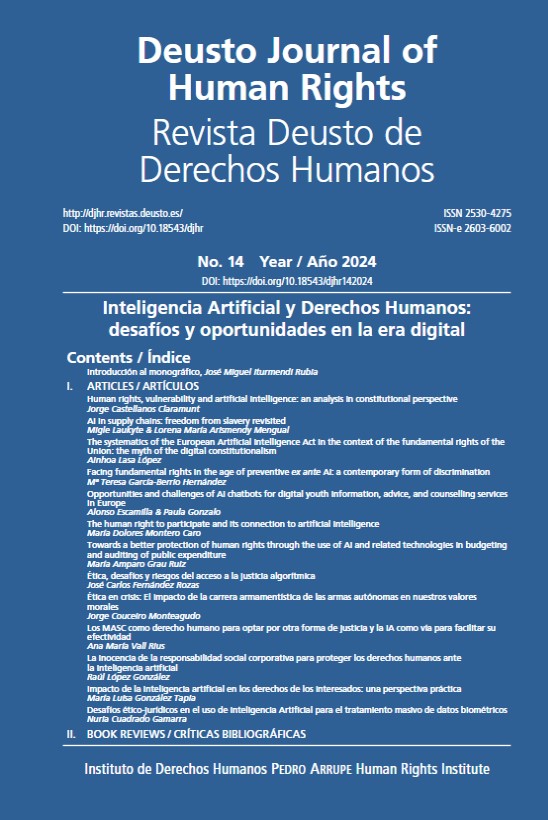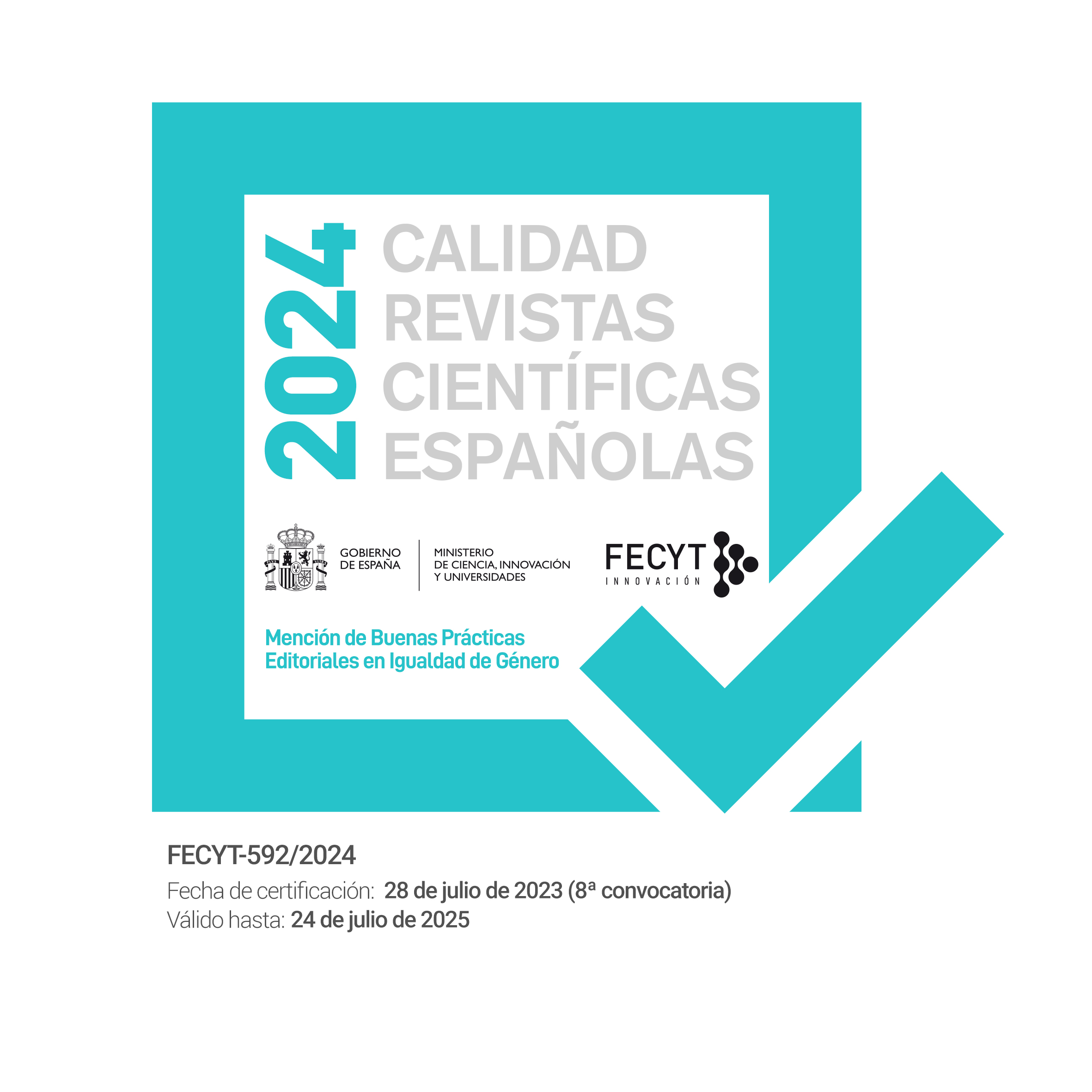Opportunities and challenges of AI chatbots for digital youth information, advice, and counselling services in Europe
Abstract
New technologies such as artificial intelligence (AI), applications and platforms are becoming more common in youth services and non-formal education, with chatbots being key examples. However, many chatbots often fail to take into account the profiles, requirements and rights of young users leading to potential risks such as biases, polarization, and low data protection standards. In carrying out this research, a literature review was done to determine the history of youth services in Europe and the prevalence of chatbots. A series of interviews with representatives of organizations that either represented young people or provided youth services at the European level were held to share their experiences and describe the key features needed for a correct use of chatbots on youth services. This study highlights the practical possibilities and limitations of AI chatbots, and the need to codesign AI tools with youth organizations and young people in order to minimize threats and maximize the effectiveness of digital youth information, advice, and counselling services in Europe.
Received: 30 May 2024
Accepted: 22 October 2024
Downloads
References
Aswathy, Karanath A., Rosalind Gonzaga, and Josna S. Francis. 2021. «A study on the awareness of artificial intelligence among youth and its impact on employment». International Journal of Advanced Research in Science, Communication and Technology 5 (1): 461–465. https://doi.org/10.48175/IJARSCT-1168.
Atkins, Suzanne, Ishwar Badrie, and Sieuwert van Otterloo. 2021. «Applying ethical AI frameworks in practice: evaluating conversational AI chatbot solutions». Computers and Society Research Journal 1.
Atmauswan, Pica S., and Akibu M. Abdullahi. 2022. «Intelligent chatbot for University Information System Using Natural Language Approach.» Advanced Science and Business Journal 3 (2): 59-64.
Chaudron, Stephane, and Rosanna Di Gioia. 2022. Artificial ntelligence and the rights of the child. Young people’s views and perspectives. Luxembourg: Publications Office of the European Union.
Council of Europe. n.d. Glossary: Artificial Intelligence (AI). Council of Europe. Accessed May 13, 2024. https://www.coe.int/en/web/artificial-intelligence/glossary#:~:text=ARTIFICIAL%20INTELLIGENCE%20(AI),abilities%20of%20a%20human%20being.
Council of the European Union. 2019. «Conclusions of the Council and of the Representatives of the Governments of the Member States Meeting within the Council on Digital Youth Work.» Official Journal of the European Union, C 414: 2. December 10. Accessed April 20th, 2024. https://eur-lex.europa.eu/legal-content/EN/TXT/?uri=CELEX:52019XG1210(01).
Crutzen, Rik, Gjalt-Jorn Y Peters, Sarah Dias Portugal, Erwin M. Fisser, and Jorne J. Grolleman. 2011. «An artificially intelligent chat agent that answers adolescents’ questions related to sex, drugs, and alcohol: an exploratory study.» Journal of Adolescent Health 48 (5): 514–519.
Dale, Robert. 2016. «The return of the chatbots.» Natural Language Engineering 22 (5): 811–817.
Digital Youth Work. 2019. European Guidelines for Digital Youth Work. YouthLink Scotland. Accessed November 6, 2024. https://digitalyouthwork.eu/guidelines/.
Dosovitsky, Gilly, and Eduardo Bunge. 2023. «Development of a chatbot for depression: adolescent perceptions and recommendations.» Child and adolescent mental health 28 (1): 124-127.
Escamilla, Alonso, and Irina Lonean. 2021. Briefing 4: Review of research on the impact of COVID-19 on youth work, youth organisations, and the digitalisation of services and activities for young people. Strasbourg: Council of Europe.
Escobar-Planas, Mariana, Emilia Gómez, and Carlos. D. Martínez-Hinarejos. 2022. «Guidelines to develop trustworthy conversational agents for children.» arXiv preprint arXiv:2209.02403.
EU-Council of Europe Youth Partnership. 2022. Research on AI and Young People. EU-Council of Europe Youth Partnership. Accessed May 2, 2024. https://pjp-eu.coe.int/en/web/youth-partnership/research-on-ai-and-young-people.
European Commission. n.d. Digital Education Action Plan (2021-2027). European Education Area. Accessed November 6, 2024. https://education.ec.europa.eu/es/focus-topics/digital-education/action-plan.
European Parliament. 2024. P9 TA(2024)0138. Legislative Resolution of 13 March 2024 on the Proposal for a Regulation of the European Parliament and of the Council on Laying Down Harmonised Rules on Artificial Intelligence (Artificial Intelligence Act) and Amending Certain Union Legislative Acts (COM(2021)0206 – C9-0146/2021 – 2021/0106(COD)). Ordinary legislative procedure: first reading.
European Parliament and Council of the European Union. 2016. Regulation (EU) 2016/679 of the European Parliament and of the Council of 27 April 2016 on the protection of natural persons with regard to the processing of personal data and on the free movement of such data (General Data Protection Regulation). Official Journal of the European Union, L 119: 1-88. Accessed April 20th, 2024. https://eur-lex.europa.eu/eli/reg/2016/679/oj.
Eurostat. 2023. 96% of young people in the EU use the internet daily. Accessed May 12, 2024. https://ec.europa.eu/eurostat/web/products-eurostat-news/w/ddn-20230714-1#:~:text=In%202022%2C%2096%25%20of%20young,94%25%20in%20all%20EU%20countries.
Eurostat. 2024. Individuals. Mobile internet sccess. Accessed May 24, 2024. https://ec.europa.eu/eurostat/databrowser/view/isoc_ci_im_i__custom_11559915/default/table?lang=en.
Feine, Jasper, Ulrich Gnewuch, Stefan Morana, and Alexander Maedche. 2020. «Gender bias in chatbot design.» In Chatbot research and design third international workshop, CONVERSATIONS 2019, Amsterdam: The Netherlands, November 19–20, 2019, Revised Selected Papers, 79-93. https://doi.org/10.1007/978-3-030-39540-7_6.
Fitzpatrick, Kathleen K., Alison Darcy, and Molly Vierhile. 2017. «Delivering cognitive behavior therapy to young adults with symptoms of depression and anxiety using a fully automated conversational agent (Woebot): A randomized controlled trial.» JMIR Mental Health 4 (2): e19.
Følstad, Asbjørn, and Petter Bae Brandtzæg. 2017. «Chatbots and the new world of HCI.» Interactions 24 (4): 38–42. https://doi.org/10.1145/3085558.
Frith, Audry, Eva Reina, Imre Simon, and Safi Sabuni. 2021. YouthInfoComp: Youth information worker competence framework. Luxembourg: ERYICA and Eurodesk.
Grové, Christine. 2021. «Co-developing a mental health and wellbeing chatbot with and for young people.» Frontiers in Psychiatry 11: 606041.
High-Level Expert Group on Artificial Intelligence. 2019. A definition of AI: Main capabilities and scientific disciplines. Brussels: European Commission.
Kooli, Chokri. 2023. «Chatbots in education and research: A critical examination of ethical implications and solutions.» Sustainability 15 (7): 5614.
Kostenius, Catrine, Frida Lindstrom, Courtney Potts, and Niklas Pekkari. 2024. «Young peoples’ reflections about using a chatbot to promote their mental wellbeing in northern periphery areas-a qualitative study.» International Journal of Circumpolar Health 83 (1): 2369349. https://doi.org/10.1080/22423982.2024.2369349.
Kravchenko, Olena, Maryna Leshchenko, Dariia Marushchak, Yuriy Vdovychenko, and Svitlana Boguslavska. 2019. «The digitalization as a global trend and growth factor of the modern economy.» SHS Web of Conferences 65: 7004. https://doi.org/10.1051/shsconf/20196507004.
Kretzschmar, Kira, Holly Tyroll, Gabriella Pavarini, Arianna Manzini, and Ilina Singh. 2019. «Can your phone be your therapist? Young people’s ethical perspectives on the use of fully automated conversational agents (chatbots) in mental health support.» Biomedical Informatics Insights 11: 1-9. https://doi.org/10.1177/1178222619829083.
Lastauskaite, Aiste, and Rytis Krusinskas. 2021. «Impact of digitalization factors on EU economic growth.» In 2021 IEEE International Conference on Technology and Entrepreneurship (ICTE), 1–6. Kaunas: IEEE. https://doi.org/10.1109/ICTE51655.2021.9584695.
Léargas, Per. 2017. «A history of youth information in Europe.» Léargas Blog. Accessed May 14, 2024. https://blog.leargas.ie/blog/a-history-of-youth-information-in-europe.
Leslie, David, Christopher Burr, Mhairi Aitken, Josh Cowls, Mike Katell, and Morgan Briggs. 2021. Artificial intelligence, human rights, democracy, and the rule of law: a primer. Strasbourg: Council of Europe.
Lu, Chia-Hui. 2022. «Artificial intelligence and human jobs.» Macroeconomic Dynamics 26 (5): 1162–1201. https://doi.org/10.1017/S1365100520000528.
Mageira, Kleopatra, Dimitra Pittou, Andreas Papasalouros, Konstantinos Kotis, Paraskevi Zangogianni, and Athanasios Daradoumis. 2022. «Educational AI chatbots for content and language integrated learning.» Applied Sciences 12 (7): 3239. https://doi.org/10.3390/app12073239.
McQuillan, Dan, and Reka Salaj. 2021. «Precarious youth and the spectre of algorithmic stereotyping.» In Young people, social inclusion and digitalisation: Emerging knowledge for practice and policy, edited by Moxon et al., 87-103. Strasbourg: EU-Council of Europe Youth Partnership.
Morgan, Jay Paul, Adeline Paiement, Jane Williams, Adam Zachary Wyner, and Monika Seisenberger. 2018. «A chatbot framework for the children’s legal centre.» In Legal knowledge and information systems, edited by Monica Palmirani, 205–209. Amsterdam: IOS Press.
Park, Arum, and Sae Bom Lee. 2024. «Examining AI and systemic factors for improved chatbot sustainability.» Journal of Computer Information Systems 64 (6): 728-742. https://doi.org/10.1080/08874417.2023.2251416.
Park, Sora, and Justine Humphry. 2019. «Exclusion by design: intersections of social, digital and data exclusion.» Information, Communication & Society 22 (7): 934–953. https://doi.org/10.1080/1369118X.2019.1606266.
Pawluczuk, Alicja. 2023. Automating youth work: youth workers views on AI. Strasbourg: EU–Council of Europe Youth Partnership.
Pawluczuk, Alicja, and Adina Mariana Șerban. 2022. Technology and the new power dynamics: Limitations of digital youth work. Strasbourg: EU-Council of Europe Youth Partnership and Council of Europe’s Youth Department.
Reina, Eva, Audry Frith, Safi Sabuni, and Imre Simon. 2020. Greening youth information services: A guide developed by ERYICA and Eurodesk. Luxembourg: ERYICA and Eurodesk.
Șerban, Adina M., Dan Moxon, Dunja Potocnik, Lana Pasic and Veronica Ştefan. 2020. «An overview of social inclusion, digitalisation and young people.» In Young people, social inclusion and digitalisation: Emerging knowledge for practice and policy, edited by Moxon et al., 87-103. Strasbourg: EU-Council of Europe Youth Partnership.
Sildnik, Hannes, and Imre Simon. 2020. Youth information and counselling in Europe in 2020. Luxembourg: ERYICA.
Siurala, Lasse. 2020. Youth work and techlash: What are the new challenges of digitalisation for young people? Strasbourg: EU-Council of Europe Youth Partnership.
Solyst, Jaemarie, Ellia Yang, Shixian Xie, Amy Ogan, Jessica Hammer, and Motahhare Eslami. 2023. «The potential of diverse youth as stakeholders in identifying and mitigating algorithmic bias for a future of fairer AI.» Proceedings of the ACM on Human-Computer Interaction 7, no. CSCW2: 364: 2 - 364: 27.
Ştefan, Veronica. 2023a. Shapers & shakers: Young people’s voices in the world of artificial intelligence. Strasbourg: EU-Council of Europe Youth Partnership.
Ştefan, Veronica. 2023b. «Digitalisation and AI in the youth sector: Reality or hype?» Coyote Magazine, Issue 36. Strasbourg: EU-Council of Europe Youth Partnership.
Stefan, Veronica. 2024. Insights into artificial intelligence and its impact on the youth sector. Strasbourg: EU–Council of Europe Youth Partnership.
Väänänen, Kaisa, Aleksi Hiltunen, Jari Varsaluoma, and Iikka Pietilä. 2020. «CivicBots – Chatbots for supporting youth in societal participation.» In Chatbot research and design, edited by Asbjørn Følstad, 143–157. Cham: Springer. https://doi.org/10.1007/978-3-030-39540-7_10.
Verke. 2020. What the bot? Chatbots in youth work. Accessed May 2, 2024. https://www.verke.org/en/blogs/what-the-bot-chatbots-in-youth-work/.
Vesa, Mikko, and Janne Tienari. 2022. «Artificial intelligence and rationalized unaccountability: Ideology of the elites?» Organization 29 (6): 1133-1145. https://doi.org/10.1177/1350508420963872.
Vetrivel, Sandhya, Chandrasekar Sowmiya, Patel Arun, Pandi Saravanan, and Rangasamy Maheswari. 2024. «Guiding principles for youth-centric development: Ethical AI.» In Exploring youth studies in the age of AI, edited by Zeinab Zaremohzzabieh, Rusli Abdullah and Seyedali Ahrari, 298-314. Hershey: IGI Global.
Deusto Journal of Human Rights / Revista Deusto de Derechos Humanos is an Open Access journal; which means that it is free for full and immediate access, reading, search, download, distribution, and reuse in any medium only for non-commercial purposes and in accordance with any applicable copyright legislation, without prior permission from the copyright holder (University of Deusto) or the author; provided the original work and publication source are properly cited (Issue number, year, pages and DOI if applicable) and any changes to the original are clearly indicated. Any other use of its content in any medium or format, now known or developed in the future, requires prior written permission of the copyright holder.



3.jpg)
3.jpg)
3.jpg)
.jpg)








